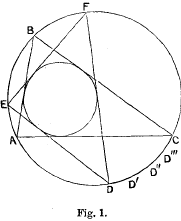Research Article
XVI.—On the Representative Relationships of the Fixed and Free Tunicata, regarded as two Subclasses of equivalent value; with some General Remarks on their Morphology
-
- Published online by Cambridge University Press:
- 17 January 2013, pp. 171-183
-
- Article
- Export citation
XVII.—On the Zoological Characters of the Living Clio caudata, as compared with those of Clio borealis given in Systematic Works
-
- Published online by Cambridge University Press:
- 17 January 2013, pp. 185-188
-
- Article
- Export citation
XVIII.—Notes on the Anatomy of the Genus Firola
-
- Published online by Cambridge University Press:
- 17 January 2013, pp. 189-191
-
- Article
- Export citation
XIX.—On the Structure and Optical Phenomena of Ancient Decomposed Glass
-
- Published online by Cambridge University Press:
- 17 January 2013, pp. 193-204
-
- Article
- Export citation
XX.—On the Polarisation of Light by Rough and White Surfaces
-
- Published online by Cambridge University Press:
- 17 January 2013, pp. 205-210
-
- Article
- Export citation
XXL.—Observations on the Polarisation of the Atmosphere, made at St Andrews in 1841, 1842, 1843, 1844, and 1845
-
- Published online by Cambridge University Press:
- 17 January 2013, pp. 211-239
-
- Article
- Export citation
XXII.—On a Pre-Brachial Stage in the Development of Comatula, and its importance in relation to certain Aberrant Forms of Extinct Crinoids
-
- Published online by Cambridge University Press:
- 17 January 2013, pp. 241-252
-
- Article
- Export citation
XXIII.—Some Account of the Recent Progress of Sanskrit Studies
-
- Published online by Cambridge University Press:
- 17 January 2013, pp. 253-283
-
- Article
- Export citation
XXIV.—On Fagnani's Theorem
-
- Published online by Cambridge University Press:
- 17 January 2013, pp. 285-298
-
- Article
- Export citation
XXV.—On the Influence of Weather upon Disease and Mortality
-
- Published online by Cambridge University Press:
- 17 January 2013, pp. 299-348
-
- Article
- Export citation
XXVI.—On the Anatomical Type of Structure of the Human Umbilical Cord and Placenta
-
- Published online by Cambridge University Press:
- 17 January 2013, pp. 349-353
-
- Article
- Export citation
XXVII.—On Earth-Currents during Magnetic Calms, and their connection with Magnetic Changes
-
- Published online by Cambridge University Press:
- 17 January 2013, pp. 355-370
-
- Article
- Export citation
XXVIII.—On the great Refracting Telescope at Elchies, in Morayshire, and its Powers in Sidereal Observation
-
- Published online by Cambridge University Press:
- 17 January 2013, pp. 371-418
-
- Article
- Export citation
Front matter
TRE volume 23 issue 2 Cover, Front matter and Erratum
-
- Published online by Cambridge University Press:
- 17 January 2013, pp. f1-f2
-
- Article
-
- You have access
- Export citation
Back matter
TRE volume 23 issue 2 Cover and Back matter
-
- Published online by Cambridge University Press:
- 17 January 2013, p. b1
-
- Article
-
- You have access
- Export citation

